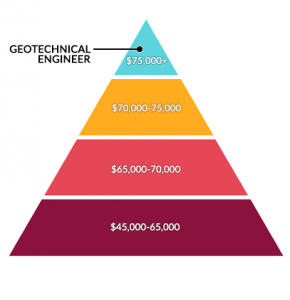The Main Principles Of Geotheta
The Main Principles Of Geotheta
Blog Article
The Buzz on Geotheta
Table of ContentsThe Definitive Guide to GeothetaGeotheta for BeginnersThe 45-Second Trick For GeothetaSome Known Facts About Geotheta.
They collaborate with civil engineers, structural designers, engineers, and various other experts to incorporate geotechnical factors to consider right into the general job layout and building and construction procedure. This calls for efficient team effort, coordination, and interaction to make certain that the geotechnical elements align with the project purposes and satisfy regulatory needs.Mining & Products Engineering: Principles of boring, infiltration prices, and variables influencing the option of drilling approach. Attributes of dynamites, firing systems and blast patterns. Blowing up techniques in surface area and underground operations. Unique blasting strategies at excavation boundaries. Resonance and noise control. Mechanical and continual strategies to fragmentation, including longwall shearing and fullface boring.
Modelling of fragment and fragment size circulations; comminution as a transfer function. Comminution innovation: crushing, grinding, size classification. Integrated evaluation of fragmentation and comminution operations. Supplied by: Mining & Materials Engineering.
The Geotheta PDFs
Bachelor's degree programs in civil, geotechnical, geological, and ecological engineering typically last four years and include general education and learning training courses in English, social scientific research, and the humanities, in addition to courses in advanced mathematics, architectural geology, and liquid mineralogy. (https://www.indiegogo.com/individuals/37984319)
Geotechnical engineering entails the analysis of the soil and rock problems at a specific site, and their ramifications for the growth of that website. As a lot of frameworks depend on the ground for support, it lacks surprise that an in-depth understanding of the ground problems, and the viability of structure systems, are important to the long-term security and performance of the structure or framework.
Specialising in the investigation of geological developments and ground behaviour, geotechnical engineers perform scientific investigations and screening to recognize the impact these geological formations may carry the design and construction of structure, civil and facilities tasks. This expertise is critical for the style and building and construction of structures, roadways, passages, dams, bridges, and water and sewer systems.
The geotechnical group at Douglas Allies routinely speak with architects, layout designers, developers, and home builders to make suggestions on design and advancement proposals to make certain that the developed structures are appropriately created for the ground conditions. For instance, the layout of footing systems needs to consider the weight of the structure, the capacity of the ground to sustain that weight together with activity tolerances and reliable building and construction.
Not known Incorrect Statements About Geotheta
This job is significantly simplified by the use our Douglas Map geospatial system which makes this info conveniently available in an easy to utilize web browser user interface. A geotechnical engineer will certainly direct the boring of boreholes and examination pits to gather dirt and various other samples, and likewise assess surface area features and ground exposures to develop a geotechnical model of the subsurface problems.
Depending on the job type and ground conditions experienced, research laboratory screening might amongst other points evaluate stamina, compressibility, reactivity and/or leaks in the structure of soil and rock examples. After this data is collected and collected, the outcomes are used for a geotechnical design of the site, which is generally provided as areas across the website.

A geotechnical investigation naturally can just analyze the ground conditions at the areas drilled or dug deep into. Natural variations in soil and rock conditions can occur across a website and in between examination locations. It is for that reason excellent technique that the geotechnical designer be retained throughout building of the job to supply on-site confirmation that the ground conditions run into are consistent with the expectations and guidance offered in the geotechnical investigation report.
How Geotheta can Save You Time, Stress, and Money.
Geotechnical designers use their comprehensive knowledge of soil and rock to assess risk and address issues on diverse infrastructure projectsGeotechnical design is a specialist branch of civil engineering which considers the practices of earth materials and the application of dirt and rock auto mechanics. Consulting Engineers. As a geotechnical designer, you will assess the physical, mechanical and chemical residential or commercial properties of dirt and rock in order to create foundations, preserving structures and earthworks
Geotechnical design is closely connected to and overlaps with, both design geology and ground design - https://issuu.com/geotheta. It's feasible to be experts in geotechnics or help a geotechnical business yet be referred to as an engineering rock hound or a ground designer. As a geotechnical designer, you'll require to: develop and keep partnerships with clients and various other experts associated with the website, throughout each projectmaintain safety and security criteria on website bear in mind this link expense implications when you make recommendationsstudy geological maps and airborne pictures from a variety of sources and from various time periodsexamine building and construction prepares to see how viable they are based on your understanding of the siteinvestigate threats or geological risks for the sitesearch for eco delicate features, such as garbage dump start to create factual and expository ground modelsplan field investigationsdrill and evaluate samples of bedrock, dirt, groundwater and additional products monitor other professionals on sitesolve technological concerns as they arise, such as unexpected structures at drill sitesmonitor conditions throughout and after building to see to it frameworks are steady in the brief and long termadding data collected on site to your first researchcreating geotechnical computations, illustrations, and two or three-dimensional computer system designs interpreting the datamaking suggestions regarding the suggested use the site

Report this page